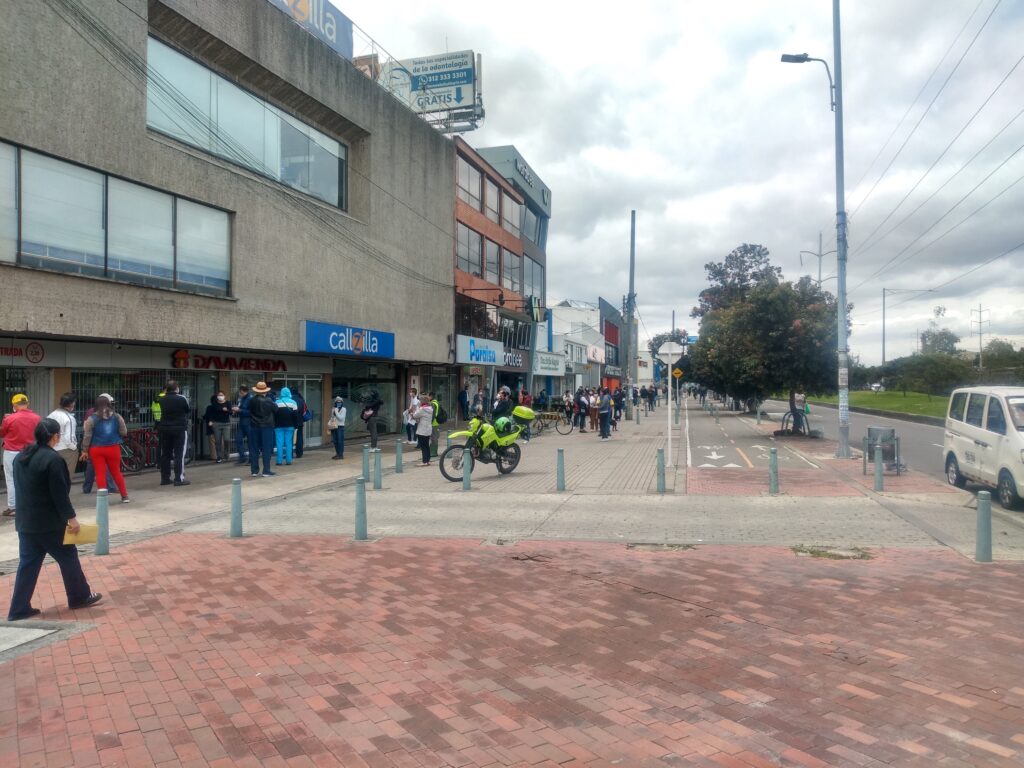As we come to the end of the second week of lockdown, we get our readers and contributors to tell us what’s going on under quarantine in Usaquén and around.

As with other parts of the city, the quarantine means a ‘new normal’ has taken hold in the northern localidad of Usaquén. Just like the quarantine in Chapinero, people report queues at supermarkets and banks, and though there are citizens on the streets, many are wearing face masks.
Ángela Forero, a long term member of our editorial team who also writes our learning Spanish column, says that the Autopista Norte looks like your regular día sin carro. A quiet quarantine day in northern Usaquén but not completely dead. A few people out with shopping bags, but not much more. A group of six or seven young Venezuelans came past asking for food on Tuesday morning. “After my neighbours set off the panic alarm and got the portero to scare them away, I managed to hand them an apple, a tangerine and a tuna can by throwing them from the window to one of the workers in the local car wash, who skilfully caught them and gave them to the young lads.”
Read our latest coverage on the coronavirus in Colombia
In Cedritos, central Usaquén, reader Giselle Nara tells us the quarantine means she’s also seen “long bank lines and quite a lot of people still on the streets.” Supermarkets there seem like they’re back to normal. It’s the same story from Daniela near the Séptima and 180, who says “In my neighbourhood, all drug stores and groceries are open but close early. Fortunately, inside my conjunto, we have a small grocery shop which is a life saver sometimes. Not only in these quarantine days but the whole year. We also have a laundry shop but for obvious reasons it has been closed. In fact, I talked to the owner like 3 days ago, she happened to be here to water her plants, and she is worried sick about this economy as she cannot operate.”
Even further south, Aussie reader Cameron Curtis says there’s not much of interest to report in Santa Barbara, “pretty quiet, though lots of delivery motos and vans about.” Surtifruver on Calle 119 #11a is fully stocked, and is requiring customers to have face masks in order to enter.
“long bank lines and quite a lot of people still on the streets.”
Giselle Nara
And contributor Brendan Corrigan reports on how the quarantine is affecting a barrio popular near to Portal Norte at the limits of Usaquén. “These economically poor and vulnerable ‘blindspots’ are at risk of being overlooked by charities offering much-needed assistance in these very difficult times as the focus is very often, understandably, on the vaster swaths of poverty to the south,” he says.
He says if one didn’t know any better, one would nearly think it was business as usual. That is to say, there is a fair amount of movement on the streets. Yes, police on motorcycles do regular rounds and appear to randomly question those walking the streets but it’s common to see groups of more than two people on corners, chatting away. Brendan’s in favour of the relaxed enforcement, saying “of course, these could be family members living under the same roof so, going by the ‘rules’, there is no issue here. The police seem, sensibly in my opinion, tolerant in this regard. They all live in very close quarters in any case, so breaking up small groups of people would seem a little pointless.”
Appearances apart, it is not business as usual. Needless to say, tienda bars are shut, save for the select few that sell for takeout. “The majority of men I know in the barrio are independent construction workers and have thus been idle the last two weeks with no income. The lucky ones have partners working in “essential” menial jobs such as shop and cleaning staff, that kind of labour, and at least have something coming in. Others, however, are the sole providers for a number of mouths.”
While adults are out on the streets, children are conspicuous by their absence. By all accounts, the police are less tolerant of children running about unchecked in the barrio so parents/grandparents have acted accordingly.
Bogotá quarantine: Soacha’s red cloths
A little further south, in the more affluent Cedritos and surrounds, you won’t see people hanging around on the streets, except for the meeting spots of Rappi and other delivery guys. Here, movement appears to be reserved for walking the dog or heading out to do some shopping or some other essential errand.
Bank queues are where you’ll find the biggest gatherings, the Davivienda on the autopista close to Calle 170 being a particular case in point. On Thursday the line ran the entire block south, extending around the corner of the next street. “On the same day, the queue to enter Éxito at Portal Norte was equally long, if not longer. Apparently it was ‘subsidy day’ so, again, more a lower-to-working class inconvenience.”
In terms of following quarantine rules and recommendations, social distancing was a bit ad hoc, two metres in places, no more than two feet in others. Most were wearing face masks, which of course is not obligatory but a number of establishments will now not allow you to enter without wearing one.
That’s reassuring given that according to yesterday’s update on coronavirus cases in Colombia, the jury is finally back on the face mask debate, with advice from the Centre for Disease Control that we should be wearing face masks.
That’s the situation in Usaquén, but how is the quarantine affecting you? If you’re living in Colombia, email us or use the comments below or on our facebook page.





